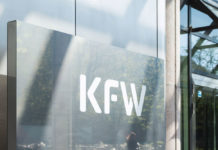There were and still are painful cuts, but the current situation in shipping is also characterized by increasingly growing realistic opportunities. That was one of the key findings at the 21st »HANSA-Forum Shipping | Financing« in Hamburg.
The growing interest in Germany’s most i[ds_preview]mportant maritime industry conference has become traceable both in terms of the number of participants and the international speakers. The latter made it clear that the crisis-ridden German shipping industry and potentially helpful financial and performance partners are approaching again. Under the motto »surviving and investing in challenging markets«, some 450 participants discussed still enormous challenges, »lessons learned« and the opportunities that exist in the market for those who prepare to face the future.
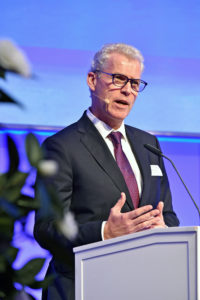
In the high-profile kick-off panel, a number of important industry representatives provided insights into their strategies. As a keynote speaker, Jeremy Nixon, CEO of Japanese container line alliance ONE, said that the new formation was very well prepared given its future size. »Big enough to survive, small enough to take proper care of« is the credo of the K Line, NYK and MOL alliance. Newbuilding orders for mega-carriers are not planned for the time being.
The second keynote speaker and shipowner Angeliki Frangou reported from her Navios Group, including the strategy to rely on a diversified fleet, because it could generate more stability in cyclical shipping. The most important reason for buying ships at low prices is not to sell high later to generate as much profit as possible. Rather, it would be in the foreground to achieve a good financial result per vessel at low S&P prices.
»More for less and better«

Mark O`Neil, CEO of merged ship management player Columbia Marlow, explained the strategy »More for less and better«. »Smaller players cannot do that,« the manager argued in favor of the merger. In his view, shipping will have to compete with new players such as AliBaba and Co., which are developing into integrated logistics platforms in the future.
The leasing arm of the Chinese Bank of Communications (BoComm) wants to expand business with German shipowners. Currently more business models are being developed, Chi Chao, Executive Manager for the Hamburg office, said. He emphasized explicitly his plan to cooperate not only with the »big ones« but also with small and medium-sized shipping companies.
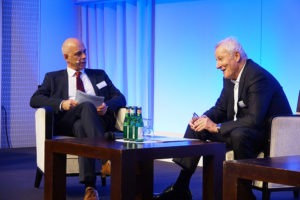
A German shipowner, who has been working on a sustainable structure for some time now, is Claus-Peter Offen. At the HANSA-Forum he said access to international capital markets was essential. The question which road to take has not been definitely resolved by his company, yet. His strategy includes the acquisition of additional companies. The shipping line itself will thus remain a private company and will not go public. »But we still want to create a platform,« says Offen.
More information, image gallery and moreNeed for alternative financing
The international capital market also signaled interest in cooperation with German shipping companies at the HANSA-Forum.
Erik Helberg, CEO of Clarksons Platou Services, defined several reasons for this. On the one hand, traditional investors like banks would withdraw while the prospects for global trade were relatively positive. At the same time the order book for the world fleet was at a low level.
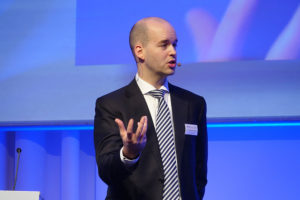
Rolf Darboven Zapffe, Managing Director of Pareto Holding – which already has a German partner with Ernst Russ – mentioned the withdrawal of ship banks and the decline in syndicated loans as reasons for the need for alternative financing. He referred to the options of bonds or project financing. »We want to bring these elements to Germany,« he said. However, the local shipping industry is still not sufficiently consolidated.
According to Henrik Haeder, Partner at Transport Capital, there is also great interest from China, »not only from leasing companies, but also other investors.«
»More active but more conservative in the future«
On the one hand, the representatives of the shipping banks announced that they would continue their economic shrinkage. However, they do not want to withdraw entirely but continue to assist the shipping lines if the conditions are right. Stefan Ermisch, CEO of HSH Nordbank, said: »It is crucial that companies approach us with fresh ideas and build up modern structures.« »We are not actively slowing down new business, but at the moment we cannot increase business with entrepreneurship anymore.« The bank has lost a lot of money over the last few years. »So I ask for respect that we do not want to experience this a second time,« Ermisch said. He called the portfolio reduction »certainly painful for some – without this path HSH Nordbank would never have been privatized.«
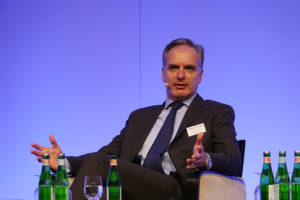
Tobias Zehnter, Global Head of Shipping at NordLB, emphasized at the Forum that NordLB wants to be »much more active again, but much more conservative than in the past.« However, they only envisage to cooperate with companies that »managed change and have created adequate structures«.
Philipp Wünschmann, Head of Shipping at Berenberg Bank, specified a promising situation: »Two recent lines of development are a perfect match: the withdrawal of some banks and the high level of investor interest.« According to the bank‘s shipping director, there is no »cap« for further transactions on the part of the bank. »That‘s up to the investors to decide. And they continue to have interest and capital.«
Among the large group of participants it was repeatedly to be heard that the lateral transfer with experts from other industry segments constitutes an important feature at the HANSA-Forum. This is true both for the lectures, as well as for extensive networking in the breaks and after the conference. The Industry will therefore observe with fascination whether maritime and financial actors will come closer again during the coming months. At the next HANSA-Forum »Shipping | Financing« 22 November 2018 these topics will be in focus again.
More information, image gallery and more








